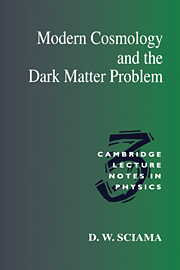Book contents
Summary
I started writing Modern Cosmology in 1969, just four years after the discovery of the 3 K cosmic microwave background. The significance of that remarkable discovery was rapidly appreciated by cosmologists, and it naturally dominated a large part of my book. Now, nearly a quarter of a century later, a new topic has come to dominate cosmology, namely, the dark matter problem. This problem, however, is not at all well understood. According to modern estimates some of the dark matter is in the form of ordinary particles — protons, neutrons and electrons — while some of it has a more exotic character. We do not know what form the ordinary dark matter takes, and we do not even know the identity of the exotic dark matter. Yet together they are a pervasive and indeed dominating constituent of the universe, in galaxies, groups and clusters of galaxies and intergalactic space. I therefore thought it desirable to update my book by writing a connected account of what has now become the single most important problem in astronomy and cosmology.
I must confess that I have a second reason for writing this book. In 1990 I proposed the idea that most of the widespread ionization of hydrogen observed in our Galaxy is produced by photons emitted by decaying dark matter neutrinos of non-zero rest-mass. The original motivation for this proposal was that the observed ionisation was puzzling astronomers because it seemed difficult to account for in terms of known sources of ionisation.
This theory, once proposed, rapidly took on a life of its own.
- Type
- Chapter
- Information
- Modern Cosmology and the Dark Matter Problem , pp. xiii - xviPublisher: Cambridge University PressPrint publication year: 1994



